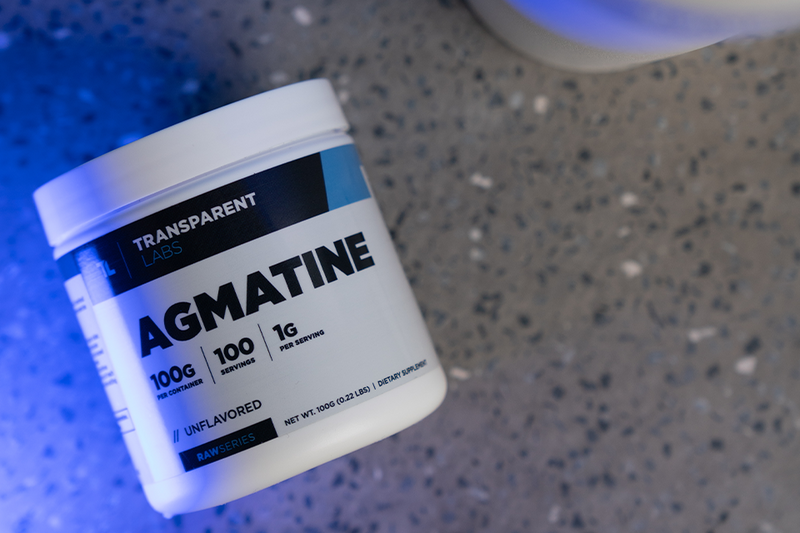Agmatine vs. Arginine vs. Citrulline: Which Nitric Oxide Booster is Best?

L-Arginine and L-citrulline seem to get all the attention when it comes to nitric oxide (NO) boosters. Still, their close relative agmatine is a worthy contender that continues to fly under the radar.
As a metabolite of L-arginine, agmatine has the familiar vasodilating properties you expect from pre-workout “pump enhancers.” However, agmatine is much more than just a NO booster; it has a handful of other ergogenic and nootropic effects that can help athletes, gym-goers, and bodybuilders get the most from their training.
This article will give you all the pertinent details about how agmatine works and differentiating agmatine vs. arginine vs. citrulline.
How Does Agmatine Work?

Agmatine, also known as guanidine, is a metabolite of the conditionally essential amino acid L-arginine. Agmatine supplements (e.g., agmatine sulfate) have been the focus of many studies in recent years due to its multifunctional properties.
Research suggests that agmatine works primarily by activating endothelial nitric oxide synthase (eNOS), imidazoline receptors, and alpha(2)-adrenergic receptors, all of which modulate nitric oxide synthesis [1, 2, 3].
These mechanisms appear to govern the various benefits of agmatine supplements, such as reducing blood pressure, expanding blood vessels, increasing beta-endorphin release, enhancing insulin sensitivity, boosting cognitive function, and inhibiting oxidative stress in neurons.
Hence, agmatine has quite a spectrum of potential uses, both in clinical practice and athletic performance.
Benefits of Taking an Agmatine Supplement

Chances are you’re under the impression that arginine supplements and agmatine supplements are interchangeable, but their benefits are somewhat distinct (and possibly synergistic).
Taking an agmatine supplement before exercising may provide a range of benefits, including:
- Promoting endothelial nitric oxide production, leading to vasodilation [4]
- Increasing insulin sensitivity and supporting glucose metabolism [5]
- Enhancing beta-endorphin secretion [6]
- Acting as a neuroprotective/nootropic compound [7]
Make no mistake, arginine and citrulline are superb supplements for their primary intended purpose: boosting NO levels and intensifying the “pump” during training. But agmatine has a host of “other” performance-enhancing effects, many of which are nootropic in nature.
Arginine vs. Agmatine vs. L-Citrulline: What’s the Difference?
L-arginine has been the go-to NO booster for decades in the bodybuilding realm. While arginine plays a myriad of roles throughout the body, it is an especially crucial substrate for synthesizing nitric oxide.
Similarly, L-citrulline is an amino acid present in the urea cycle that significantly increases plasma L-arginine concentrations after ingestion [8]. Thus, L-citrulline is becoming the NO booster of choice in pre-workout powders.
But where does an agmatine supplement fit into the picture?
Biochemically speaking, it goes something like this: L-citrulline → L-arginine → agmatine
As you can see, all three molecules are related to one another; agmatine is one of the metabolites produced when you take a citrulline or arginine supplement. Though, taking an agmatine supplement is not the same as taking arginine or citrulline. They each serve discrete purposes.
Moreover, it’s not entirely clear whether an agmatine supplements confer synergy with, or antagonize, the effects of arginine supplements (and by extension, citrulline supplements). Either case is plausible from a physiology standpoint [9].
What to Look for in an Agmatine Supplement
Agmatine sulfate is the most common supplemental form of agmatine. You’re most likely to see it in pre-workout formulas and pump boosters. The conundrum is many of these supplements are high in stimulants.
Having some caffeine in a pre-workout can be useful, but loading up on stimulants before you hit the gym will rapidly abolish the benefits of NO boosters like agmatine, arginine, and citrulline.
CNS stimulants are vasoconstricting, meaning they increase blood pressure and make it harder to achieve skin-splitting pumps. Unfortunately, many “concentrated” pre-workouts contain borderline egregious doses of stimulants. Sure, it might make your pre-workout seem like it’s “working,” but it’s doing more harm than good.
If you’re just after a rush of caffeine, save your money and drink coffee - Mother Nature’s veritable “energy” drink. On the other hand, if you’re looking for a comprehensive preworkout that helps you perform better and enhances the pump, you’ll want something that is stimulant-free or contains a reasonable amount of caffeine/stimulants.
For most active adults, 2-3 mg of caffeine per kg of body weight is plenty for enhancing cognitive function and athletic performance [10]. A 100-kg (~220-lb) person, for example, should limit their pre-workout caffeine intake to 200-300 mg.
Agmatine sulfate and other NO booster supplements work best when they don’t have to compete against the vasoconstrictive actions of stimulants. With that in mind, taking an agmatine supplement pre-workout is worth a shot if you’re “chasing the pump,” as they say.
How Much Agmatine to Take?
Agmatine dosing should remain between 500 - 1,000 mg at a time, and no more than 2,000 mg daily. Higher doses (3.5 g daily) of agmatine appear safe, but more human data is necessary to confirm the effects [11]. For proper absorption, it’s best to take agmatine sulfate on an empty stomach.
If you use a pre-workout with arginine and/or citrulline, it’s probably better to take agmatine sulfate either after your workout on an empty stomach, or about 30 minutes before a meal.































